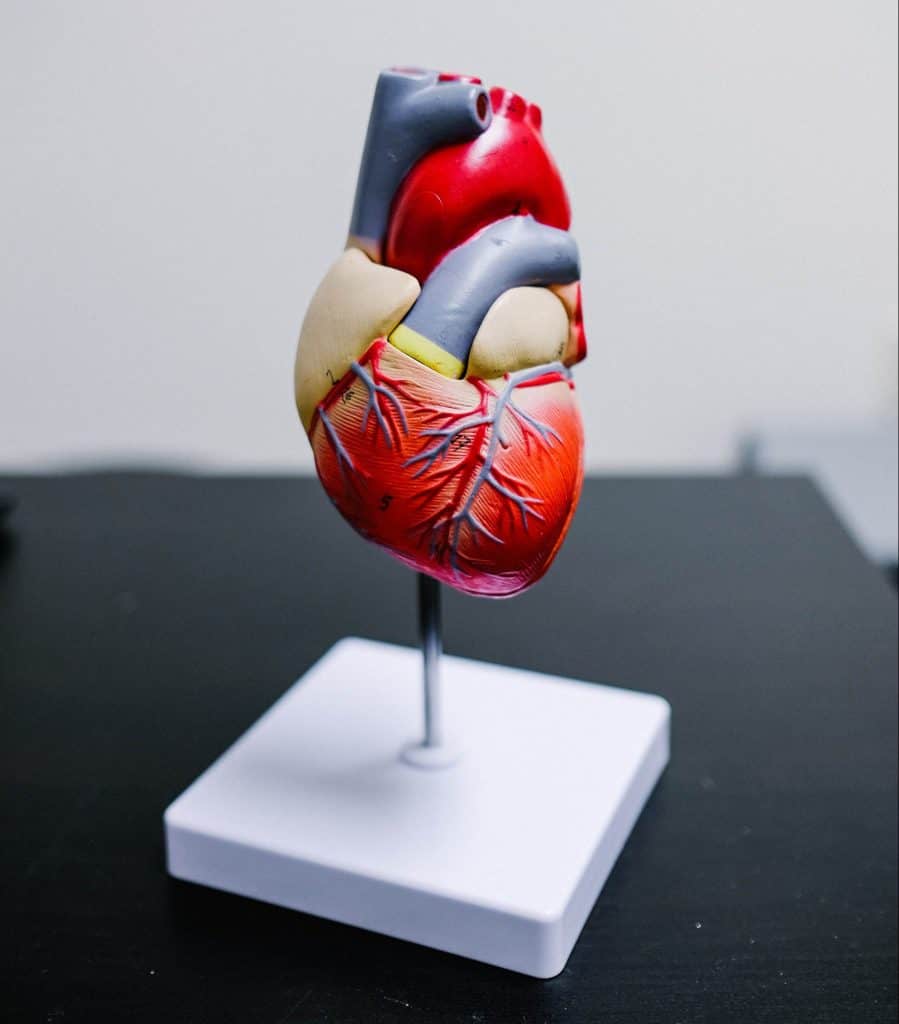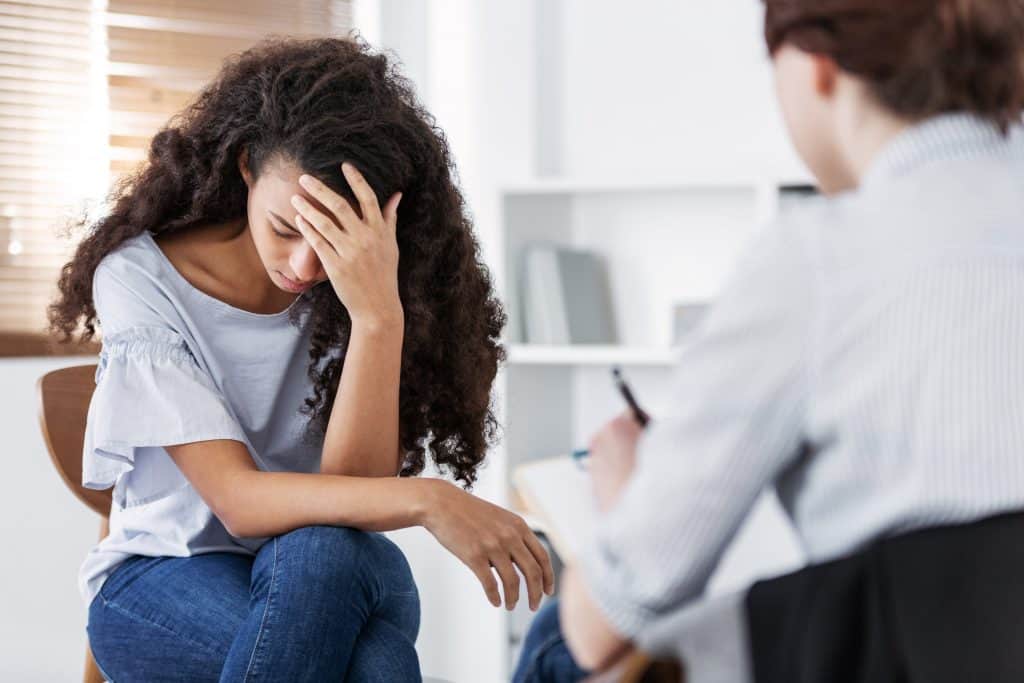Anxiety is your body’s natural response to stress, but sometimes it can become so overwhelming that it begins to negatively impact your work, relationships, and life in general.
One of the best ways to manage anxiety is by talking to a licensed therapist.
In this guide, we’ll go over the three best online anxiety therapy services. By connecting with a licensed therapist specializing in anxiety disorders, you can begin to free yourself from the control your anxiety has over you.
Want to skip right to the suggestions for online anxiety therapists? Here are our 3 recommended therapy solutions:
Best online anxiety therapy platforms
In this section, we’ve looked at the three best online therapy platforms that can help you with anxiety.
1. BetterHelp
Explore emotional well-being with BetterHelp – your partner in affordable online therapy. With 30,000+ licensed therapists and plans starting from only $65 per week, BetterHelp makes self-care accessible to all. Complete the questionnaire to match with the right therapist.
BetterHelp provides a wide range of online anxiety therapy and mental health services. Whether you’re looking for advice, diagnosis, or treatment, BetterHelp’s licensed therapists can provide online therapy to help you overcome anxiety.
On the BetterHelp platform, you can choose how you want to access their mental health services – either by phone or video chat, phone calls, text messaging, or a combination of the three. For example, you can contact your counselor by text message, in between your scheduled therapy sessions, and they’ll respond as soon as possible.
This ensures that if you experience anxiety, you can share your thoughts and feelings immediately. Also, flexibility in how you communicate with your therapist is especially helpful if you struggle with anxiety, because sometimes it feels too overwhelming to engage in a live conversation with a therapist.
It’s easy to sign up and find a quality licensed therapist with BetterHelp. Simply fill out their online form at your own pace, and you’ll be matched with an appropriate mental health professional who knows how to treat anxiety/depression. You can change counselor at any time through their online platform.
BetterHelp also offers a journaling feature, which can be especially helpful if you’re struggling with anxiety disorders. Journaling can help people overcome anxiety because it allows you to better understand your fears, problems, and concerns. The act of writing your anxious thoughts down helps you keep track of any anxiety triggers, so you can feel better equipped to handle them when they arise.
The BetterHelp journaling feature is also an excellent opportunity to start practicing positive self-talk – something people with anxiety disorders often struggle with. You can also choose to share your journal with your therapist so they can gain a deeper understanding of the underlying reasons for your anxiety, and help you to identify and mitigate the effects of any anxiety triggers.
Along with providing online therapy that meets your specific needs, BetterHelp also offers daily educational webinars and workshops that are free for members. They have webinars for anxiety and depression, panic disorder, substance abuse, and other health care topics relating to anxiety.
These workshops are a great resource to use in conjunction with online therapy. They allow you to maximize the level of support you’re getting in between each session with your licensed therapist, as well as deepen your understanding of your mental health and how to overcome any anxiety disorder you may have.
2. Online-therapy.com
Discover transformative online therapy with Online-therapy.com. Through cognitive behavioral therapy (CBT), Online-therapy.com offers individual and couples support starting at $45/week. Engage in sessions via video, voice, or text for maximum flexibility. Fill out their online questionnaire to get started.
Online-therapy.com is an online anxiety therapy and mental health platform that specializes in Cognitive-Behavioral Therapy (CBT). CBT is helpful for anxiety because it encourages you to make sense of overwhelming thoughts and feelings by breaking them down into more manageable parts.
CBT breaks down problems into five main areas- situations, thoughts, emotions, physical feelings, and actions. Each of these parts is interconnected – for example, your thoughts about a situation can affect how you feel physically and emotionally, which in turn can affect how you act in response.
With Online-therapy.com, you are matched with one of the many board-certified licensed therapists on the platform, who will then address your challenges and pain points, as well as your goals for online therapy.
You are then directed to complete a self-guided course, that helps you begin to dig deeper into the underlying causes of your anxiety. Your online therapist is there to help guide you through the modules and worksheets if you need them, and they can use your answers and reflections to gain a better understanding of how to provide the best therapy possible for you during your regular meetings.
3. Talkspace
Tailored to individuals, couples, teens, and offering psychiatry services, Talkspace plans kick off at a wallet-friendly $69 per week. What’s more, many health insurances also cover their services, enhancing accessibility and affordability. Complete a questionnaire and get matched with the right therapist for you.
Talkspace is an online therapy app that provides mental health services for people with anxiety disorders.
The sign-up process for Talkspace is a bit different than other mental health platforms. While other online therapy services like BetterHelp use automated technology to match you with an online therapist, Talkspace uses actual licensed therapists to match you with the counselor most appropriate for your needs.
This means that to begin with, you have to have a live chat conversation with a therapist, which can be a bit daunting if you have extreme anxiety. However, after talking to your intake therapist, you are given three board-certified licensed counselors to choose from. The opportunity to choose from your own customized list of licensed therapists can help people with anxiety feel more in control of their experience.
Talkspace accepts some health insurance plans, unlike many other online therapy platforms, and the service may be covered by your behavioral health benefits plan or employee assistance programs (EAP) at work, helping you to save money. They offer a few different subscriptions options for online anxiety therapy.
You can choose a plan that includes live video chats with your therapist, or you can opt to just receive online therapy through text messaging for a cheaper price. The text messaging feature is something you might prefer if your anxiety makes it difficult to talk with a counselor face to face.
Lack of privacy is something people with anxiety sometimes worry about when it comes to online counseling. Both in-person counseling and online therapy are dependent on having safe, private spaces for therapy services. However, depending on your living situation, you may not get a lot of privacy, making video and phone sessions with a therapist feel challenging.
With Talkspace text messaging on their intuitive mobile app, you can feel free to chat with your therapist throughout the day with little emotional commitment – even if you are traveling, at college, or with your family at home.
What is anxiety?

Your brain is designed to keep you safe. When it senses danger, whether real or imagined, it reacts by sending signals and releasing chemicals that alert the rest of your body to prepare to either fight the threat or run away from it. This is also known as the “fight or flight” response.
Fight or flight is how your body responds to stressful situations. Millions of years ago, the world was a much different place, and we humans spent our days trying to survive surrounded by dangerous animals and other life-threatening situations.
To adapt to these harsh living conditions, our brain and nervous system evolved to create this “fight or flight” stress response that was triggered whenever it sensed danger.
While this stress response comes in handy when you are running away from a saber tooth tiger, it doesn’t work as well in our modern society. We no longer have to worry about being chased by wild animals on a daily basis, but our brains’ evolution has not yet caught up with our modern way of life.
This means that your brain often reacts to a debt collector or a problem with your in-laws the same way it would a mountain lion. But most of the time, running away or fighting to the death won’t help you to resolve these modern-day problems.
Even though anxiety is a natural response to a stressful situation, it becomes a problem if it’s all-encompassing and starts to negatively impact your life.
What are the symptoms of anxiety?
Anxiety manifests in many different ways from person to person and situation to situation.
You may associate anxiety solely with your mental health, but the truth is anxiety affects your entire body as well.
When your brain senses danger, it triggers the release of adrenaline and other stress hormones. This causes several things to occur in your body:
Your muscles tense up
Anxiety causes your muscles to tense up, because it’s your body’s way of preparing for fight or flight. But as a result of this muscle tension, you may feel jittery, weak, or shaky, you may develop headaches, or you might unconsciously clench your jaw or grit your teeth.
Because of this tension, you may experience neck and shoulder pain as well. We each carry our tension in different ways, so it’s important for you to become aware of what parts of your body usually tense up when you are feeling anxious.
Your heart rate increases

Anxiety causes your heart rate to increase because your body is preparing to run away or stay and fight. Your increased heart rate pumps more blood and oxygen into your limbs so you can protect yourself. But this can feel alarming if you don’t know what’s happening.
Feeling your heart pounding can often increase your anxiety because you may feel like you’re having a heart attack. But this is just your heart trying to help you – however unhelpful it may seem in the moment.
Your pupils dilate
Your pupils dilate when you are anxious to expand your field of vision. This is your brain’s way of trying to help you see whatever threat is coming at you.
But as a result of your dilated pupils, you may find yourself feeling very sensitive to light. Things may seem too bright, your vision may blur, or you may see spots. You may experience tunnel vision as well. This can feel incredibly scary if you don’t understand what’s happening and can make you feel even more anxious than you already are.
Your digestion shuts down

Anxiety is linked to digestive issues like nausea and diarrhea. This is because when we are in fight or flight, our body redirects our blood to our lungs, limbs, and main fighting muscles to prepare us to run away or fight.
As a result, you may get queasy, or feel butterflies in your stomach. You may also get a dry mouth or feel like you have a lump in your throat.
Your blood flow changes course
The blood flow in your body changes course when you are experiencing anxiety. The blood vessels in your extremities, like your head, hands, and feet, constrict so that other blood vessels can open up and more easily send blood and oxygen to the main muscles you need to run away or fight.
But this can cause you to feel cold, tingly, or numb. You may also feel dizzy or lightheaded. Because blood flow moves away from your head and into your trunk, you may also start to notice that you have trouble concentrating on things.
What are my treatment options for anxiety?

There are many different types of treatment and therapy that can help you manage your anxiety.
A licensed therapist can help you with medical advice, diagnosis, and treatment options that would be most beneficial to you. Treatment plans for anxiety might include Cognitive-Behavioral Therapy (CBT) and/or medication in some cases.
Cognitive-Behavioral Therapy
Cognitive-Behavioral Therapy (CBT) is a helpful treatment option if you are struggling with mental health conditions, including anxiety. You can get CBT with an in-person appointment, or through an online therapy provider.
CBT is helpful for things like generalized anxiety disorder, social anxiety disorder, and panic disorder because it helps you recognize and unlearn the internal narratives that are hindering your mental health.
CBT is a type of talk therapy used by licensed therapists that focuses on changing knee-jerk responses and automatic thoughts that worsen anxiety, depression, and other mental health conditions.
With CBT, you can identify subconscious negative thought patterns and rewire them into a way that serves you. If you have social anxiety for example, you may practice recognizing and challenging an anxious thought so you can replace it with something more realistic, and more beneficial for you.
For instance, thinking “I hate going to parties, I can never think of anything to say – everyone must think I’m so awkward” is a thought that you might replace with “Just because I feel awkward at parties doesn’t mean that’s what everyone else sees”.
Medication and supplements
Medication is a treatment you can take if diagnosed with an anxiety disorder. There are a number of medications that can be a helpful addition to online therapy. Prozac, Zoloft, Lexapro are typical medication options that can help to ease your anxiety symptoms.
Although medication can be an incredible tool to help your symptoms, it is a common misunderstanding that taking medication is going to erase all of your symptoms and challenges. Therapy and self-care practices are important parts of the equation that should not be overlooked.
Typically, medication is used when your anxiety symptoms are so severe as to be disabling. However, it’s still important to address the root causes of your issue, so you don’t necessarily have to rely on medication in the long term.
How can I improve my own anxiety?

It’s estimated that around 275 million people around the world suffer from anxiety disorders.
Because this is such a common problem, there are a variety of self-care methods you can use in addition to therapy or medication to control and combat your anxiety disorder and improve your mental health.
Mindfulness
Mindfulness is one of the most effective ways to help ease anxiety.
When you are mindful, you are fully in the present moment. Your inner chatterbox has taken a back seat and you are fully aware of what you are doing and what is happening around you.
This moment-by-moment awareness helps to ease anxiety, because we often automatically resist whatever doesn’t feel good. This resistance only creates more suffering and more anxiety.
With mindfulness, you can learn to be present with your anxiety and the thoughts, feelings, and bodily sensations that are associated with it. By being fully present, you are no longer identifying as your anxiety, but are instead a witness to it.
Meditation

Along with mindfulness, meditation is a common tool used to help anxiety disorders. There are many different types of meditation, and many different ways to meditate, but at its core, meditation is a practice of focused concentration.
When you meditate, it’s common to get swept away by random thoughts and feelings. But meditation helps you understand that you are not your thoughts – rather, you’re a witness to them. When you are merely the observer of your anxious thoughts instead of identifying with them, you are no longer offering as much resistance to your anxiety.
This disidentification with the mind creates a kind of buffer between you and your anxiety. When you practice meditation, you are still aware of your anxiety symptoms, such as your frantic thoughts, clenched jaw, and pounding heart, but you are no longer controlled by your anxiety.
Yoga
Yoga can be an effective method for combating anxiety because it trains you to breathe and release tension. When you’re anxious, your body tenses and constricts. You seize up in your neck, shoulders, jaws, and other body parts. This muscle tension signals back to the brain that something is wrong, which then perpetuates the feelings of anxiety. It’s a vicious cycle, but practicing yoga helps you tune into your body so that you can become aware of when you’re tensing so you can then consciously release it.
Yoga is also an excellent tool for anxiety because it focuses on proper breathing techniques, and your breath is a direct line to your nervous system. When you are anxious, you tend to either hold your breath or take rapid, shallow breaths. This type of breathing actually activates the part of your nervous system responsible for fight or flight.
Yoga teaches you to breathe with awareness. Taking long, deep, belly breaths activates the part of your nervous system that is responsible for rest and relaxation. Yoga teaches you to breathe deeply while moving your body through challenging poses. By training yourself to breathe deeply even when you are not in a state of rest, this helps you to manage your anxiety by managing your breathing. If you are able to take slow, deep breaths when you feel anxious, this sends a signal to your body that it’s safe to relax.
Conclusion
This is the end of our article on the best online therapy platforms to help you manage an anxiety disorder.
We hope you’ve found the right path forward to improve your mental health.
If you’re still not sure which online therapy platform to choose to treat your anxiety/depression, feel free to leave us a comment below and we’ll help you decide between different online counseling and mental health services.





